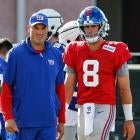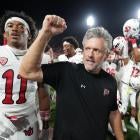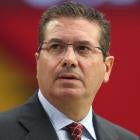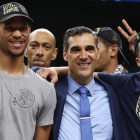The FBS commissioners assembled Wednesday in Dallas for their annual College Football Playoff meeting. There’s a chance not much football will be discussed.
This will be the first time the 10 have met face-to-face since legislation was passed earlier this month banning satellite camps. If you haven’t noticed, the issue has officially turned into a cluster.
Michigan coach Jim Harbaugh ruffled feathers last year when he proudly went into Alabama and other states to participate in offseason camps with the Wolverines' staff as “guest coaches.” These satellite camps were completely allowed by NCAA rules, but the SEC and ACC pushed back, leading a charge that resulted in such camps being banned on April 7 by the NCAA.
Except, when you read the NCAA release that said the legislation was “effective immediately,” that was not true. The controversial legislation won’t be official until it is ratified by the NCAA Board of Governors on April 28.
That is ... if it is ratified. It still isn’t clear what steps the board can take. New governance rules seemingly allow a “rescission” of legislation should two-thirds of the membership vote directly against it. It’s possible the vote could be tracked in real time online. However, it would take 60 days.
It's safe to say there is significant national push back on the ban. An online petition to overturn the legislation has more than 14,000 supporters. Dozens of coaches have spoken out.
Speaking in Ohio this week, NCAA vice president Oliver Luck said he expects the issue to be “revisited.” When asked for further comment by CBS Sports, Luck declined.
“The NCAA shot from the hip,” Washington State athletic director Bill Moos said. “Now, we’re going through damage control.”
The issue has highlighted the concept of NCAA Council members being able to vote their conscience on such issues. The 10 representatives of the council -- one for each of the FBS conferences -- decided the issue.
Seemingly, reps from two conferences -- Pac-12 and Sun Belt -- voted against a sizable mandate within their leagues on satellite camps. Two sources, including Moos, told CBS Sports that Pac-12 council rep Dan Guerrero voted against satellite camps despite 11 conference athletic directors voting for the measure with one abstention.
That abstention, sources said, was UCLA.
“[If] you can vote your conscience, then why did you abstain from the conference vote?” Moos asked rhetorically. “If you don’t like it, don’t take a firm stand on a bowl of Jello.”
Late Wednesday, Pac-12 commissioner Larry Scott told Fox Sports that Guerrero "did not vote the way he was supposed to" on the satellite camp legislation as Pac-12 rules stipulated that he vote along with the majority of the member schools' opinion. "It's still not perfectly clear how that happened," Scott told Fox Sports.
Guerrero initially declined comment through a spokesman, deferring to council chair Jim Phillips. But after Scott's remarks, UCLA released this email Guerrero had previously written to Pac-12 colleagues explaining his vote.
Sun Belt NCAA Council rep Larry Ties, the athletic director at Texas State, cast his vote against satellite camps despite a “majority” of conference officials supporting it, according to commissioner Karl Benson.
All of this is allowed by the NCAA legislative process. Council members are expected to consider input from around the conference before making their own decisions.
“The majority of Sun Belt membership did support the camps,” Benson said. “It wasn’t unanimous, but Larry Ties based [his vote] on dialogue. He made a decision based on the best interests of college football.”
“There are conferences that do a crap job of prepping their people,” countered one FBS official.
According to one source, the satellite camp legislation was pushed through despite a late motion to table it. An NCAA committee did just that last year with a controversial early signing period proposal.
This issue has become just as divisive. The final vote among the 10 conferences was 6-4 against satellite camps. The Power Five conferences are double weighted with two votes each, so when four of the Power Five voted in favor, the measure became automatic.
At root is the NCAA’s struggle to keep major college football from becoming the recruiting cesspool that is college basketball.
There is concern Harbaugh Over America satellite camps would become nothing more than recruiting tours. At root, that’s what they are anyway, but again, Harbaugh did nothing wrong. He merely pushed the boundaries too far, upsetting the SEC and ACC.
The intimation: If satellite camps were allowed to stand, at least the 14 SEC schools would have fanned out across the country like it was the Homestead Act claiming camp “territory.”
“OK, so if they’re legal, there’s going to be 100 satellite camps in Atlanta, there’s going to be 100 in Miami and Dallas and Houston and New Orleans,” Alabama coach Nick Saban said. “How’s a kid going to go to a camp every day? They’re not.
“Let’s try to get them to come to us down here [on the Alabama campus]. We have a better quality camp.”
A sensible middle ground: Delay the legislation a year. Think. Discuss. The game isn’t going to collapse if there is further vetting.
It may be the NCAA eventually establishes and oversees a series of nationwide camps that coaches can attend. That would make things a heck of a lot more savory than the shoe company-sponsored hoops recruiting circuit.
A group of non-institutional camps are working on a grassroots strategy to at least delay the satellite camp legislation.
Alema Teo, a Salt Lake City-area high school coach, has run the All Poly Sports camp for the past 15 years. It is known nationwide for exposing players of Polynesian descent to college football coaches.
In each case, it costs thousands of dollars to fly kids over from the Pacific Islands. Notable alumni of Teo's camp include Notre Dame star Manti Teo (Hawaii) and Utah’s Star Lotulelei (Tonga).
Alema Teo said he has borrowed against his house four times to keep the camp solvent. Now that it is turning a modest gain, the 501(c)(3) non-profit entity faces its biggest challenge.
Kids will stop coming because they can’t be seen by FBS coaches who are now prohibited from attending, Teo explained. Fewer kids mean less funding for those prospects from across the Pacific. Teo said some proceeds from the camp also go to fund the five high school programs in American Samoa.
“You’ve got to give us a heads up,” Teo said, “instead of giving everyone the death penalty.”
The players will come this year. Most of the registration money is in the bank. Reservations have been made. For now, they won’t be seen by FBS coaches.
The venerable Manning Passing Academy is another one of those non-institutional camps. While the counselors are sometimes celebrities, the campers are not. It wasn’t discovered that Russell Wilson had once attended until the Seattle Seahawks made the Super Bowl.
Football and family patriarch Archie Manning said a couple of SEC coaches once complained the camp in Thibodeaux, Louisiana, was “nothing more than a recruiting camp for Ole Miss and Tennessee.” They were referring to the schools of Manning's sons, Eli and Peyton.
“Nothing,” Manning said, “could be further from the truth.”Manning lays down a strict “no recruiting” edict to visiting coaches. Those coaches aren’t allowed to wear their school colors at the camp. The wildly successful camp attracted 1,200 youths last year.
“We have stood strong on our mission,” Manning said. “Some of them go on and play college football, but we hardly know it. We do not track them.”
In fact, Manning tells any highly rated prospect who calls that “he needs to go to a college camp. He needs to be seen. That’s not who we are. ”





















